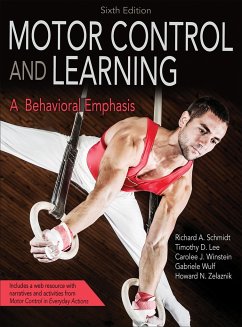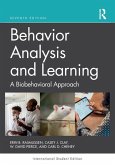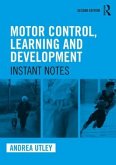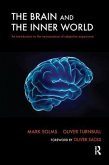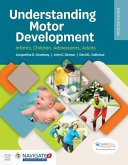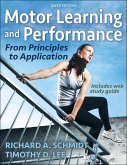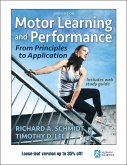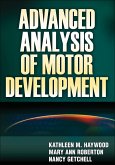- Gebundenes Buch
- Merkliste
- Auf die Merkliste
- Bewerten Bewerten
- Teilen
- Produkt teilen
- Produkterinnerung
- Produkterinnerung
Motor Control and Learning, Sixth Edition With Web Resource, focuses on observable movement behavior, the many factors that influence quality of movement, and how movement skills are acquired.
Andere Kunden interessierten sich auch für
![Behavior Analysis and Learning Behavior Analysis and Learning]() Erin B. RasmussenBehavior Analysis and Learning52,99 €
Erin B. RasmussenBehavior Analysis and Learning52,99 €![Motor Control, Learning and Development Motor Control, Learning and Development]() Andrea Utley (UK University of Leeds)Motor Control, Learning and Development47,99 €
Andrea Utley (UK University of Leeds)Motor Control, Learning and Development47,99 €![The Brain and the Inner World The Brain and the Inner World]() Mark SolmsThe Brain and the Inner World45,99 €
Mark SolmsThe Brain and the Inner World45,99 €![Understanding Motor Development: Infants, Children, Adolescents, Adults Understanding Motor Development: Infants, Children, Adolescents, Adults]() Jacqueline D. GoodwayUnderstanding Motor Development: Infants, Children, Adolescents, Adults80,99 €
Jacqueline D. GoodwayUnderstanding Motor Development: Infants, Children, Adolescents, Adults80,99 €![Motor Learning and Performance Motor Learning and Performance]() Richard A. SchmidtMotor Learning and Performance143,99 €
Richard A. SchmidtMotor Learning and Performance143,99 €![Motor Learning and Performance 6th Edition With Web Study Guide-Loose-Leaf Edition Motor Learning and Performance 6th Edition With Web Study Guide-Loose-Leaf Edition]() Richard A. SchmidtMotor Learning and Performance 6th Edition With Web Study Guide-Loose-Leaf Edition95,99 €
Richard A. SchmidtMotor Learning and Performance 6th Edition With Web Study Guide-Loose-Leaf Edition95,99 €![Advanced Analysis of Motor Development Advanced Analysis of Motor Development]() Kathleen M. HaywoodAdvanced Analysis of Motor Development102,99 €
Kathleen M. HaywoodAdvanced Analysis of Motor Development102,99 €-
-
-
Motor Control and Learning, Sixth Edition With Web Resource, focuses on observable movement behavior, the many factors that influence quality of movement, and how movement skills are acquired.
Produktdetails
- Produktdetails
- Verlag: Human Kinetics Publishers
- Sixth Edition
- Seitenzahl: 552
- Erscheinungstermin: 19. Februar 2018
- Englisch
- Abmessung: 287mm x 220mm x 35mm
- Gewicht: 1506g
- ISBN-13: 9781492547754
- ISBN-10: 1492547751
- Artikelnr.: 49558173
- Verlag: Human Kinetics Publishers
- Sixth Edition
- Seitenzahl: 552
- Erscheinungstermin: 19. Februar 2018
- Englisch
- Abmessung: 287mm x 220mm x 35mm
- Gewicht: 1506g
- ISBN-13: 9781492547754
- ISBN-10: 1492547751
- Artikelnr.: 49558173
Richard A. Schmidt, PhD, passed away in 2015, leaving a legacy of groundbreaking research in motor control and learning. He had authored the first edition of Motor Control and Learning in 1982; followed up with a second edition of the popular text in 1988; and collaborated with Timothy Lee for the third edition in 1999, the fourth edition in 2005, and the fifth edition in 2011. Schmidt was a professor emeritus in the department of psychology at UCLA and ran a consulting firm, Human Performance Research, working in the areas of human factors and human performance. The originator of schema theory, Schmidt founded the Journal of Motor Behavior in 1969 and was editor for 11 years. Schmidt received two honorary doctorate degrees, from Catholic University of Leuven (Belgium) and Joseph Fournier University (France), in recognition of his work. He was a member of the North American Society for the Psychology of Sport and Physical Activity (of which he was president in 1982), the Human Factors and Ergonomics Society, and the Psychonomic Society. Timothy D. Lee, PhD, is a professor emeritus in the department of kinesiology at McMaster University in Hamilton, Ontario. He has published extensively in motor behavior and psychology journals since 1979, served as an editor for the Journal of Motor Behavior and Research Quarterly for Exercise and Sport, and has been an editorial board member for Psychological Review. Until his retirement in 2014, his research was supported primarily by grants from the Natural Sciences and Engineering Research Council of Canada. Lee is a member and past president of the Canadian Society for Psychomotor Learning and Sport Psychology (SCAPPS) and a member of the North American Society for the Psychology of Sport and Physical Activity (NASPSPA). In 1980, Lee received the inaugural Young Scientist Award from SCAPPS, and 31 years later he was awarded its highest honor, being named a fellow of the society. He presented a prestigious senior lecture at NASPSPA's 2005 conference and received the organization's highest honor, the Distinguished Scholar Award, in 2017. In his leisure time, Lee enjoys playing golf. He has maintained a lifelong fascination with blues music and would one day love to put years of motor learning study into practice by learning to play blues guitar. Carolee J. Winstein, PhD, PT, is a professor of biokinesiology and physical therapy at the University of Southern California, as well as in the department of neurology at the Keck School of Medicine. Winstein serves as an associate editor of the journal Neurorehabilitation and Neural Repair and is a fellow of the American Physical Therapy Association (APTA), the American Heart Association (AHA), and the National Academy of Kinesiology (NAK). She has more than 30 years of multidisciplinary collaborative research experience focused on understanding rehabilitation outcomes and promoting optimal recovery of goal-directed movement behaviors that emerge from a dynamic brain-behavior system in brain-damaged conditions. Over the past 25 years, her research program has been consistently funded through NIH, NIDILRR, and the Foundation for Physical Therapy. She has authored or coauthored more than 120 research papers, chapters, proceedings, and commentaries. Recently, the Journal of the American Medicaal Association published the results of her NIH-funded, multisite clinical trial of stroke rehabilitation. Winstein has mentored over a dozen doctoral students and postdoctoral scholars from diverse fields, including engineering, neuroscience, and rehabilitation. In her free time, Winstein enjoys gourmet cooking and is pursuing her private pilot's license to fly a Cessna 172. Gabriele Wulf, PhD, is a professor in the department of kinesiology and nutrition sciences at the University of Nevada at Las Vegas. Wulf studies factors that influence motor skill learning, including the performer's focus of attention and motivational variables (e.g., autonomy support and performance expectancies). Wulf has received various awards for her research, including UNLV's Barrick Distinguished Scholar Award. She served as president of the North American Society for the Psychology of Sport and Physical Activity (NASPSPA) in 2015. She has been elected a fellow of the National Academy of Kinesiology (NAK). Her research has resulted in approximately 200 journal articles and book chapters, as well as two books. She served as the founding editor of Frontiers in Movement Science and Sport Psychology (2010-2012) and the Journal of Motor Learning and Development (2012-2015). In conjunction with Rebecca Lewthwaite, Wulf developed the OPTIMAL theory of motor learning. In her leisure time, Wulf enjoys golf, tennis, skiing, and photography. Howard N. Zelaznik, PhD, is a professor of health and kinesiology at Purdue University. He is a fellow of the National Academy of Kinesiology, the Association for Psychological Science, the Psychonomic Society, and the American Association for the Advancement of Science, and he is an active member of the North American Society for the Psychology of Sport and Physical Activity. Zelaznik has served as executive editor for the Journal of Motor Behavior. His research specialty is human motor control. Over the past 15 years, Zelaznik has developed, tested, and promoted a theoretical framework to examine issues in human movement timing. He has been funded for over 30 years by NIH and currently has an interdisciplinary project funded by NSF. A former college tennis player, Zelaznik is still an active (albeit unranked) tennis player. He is an active road cyclist and former marathon runner. As his students continually tell him, he does not have a good sense of humor, although he loves to laugh.
Part I. Introduction to Motor Behavior
Chapter 1. Evolution of a Field of Study
Understanding Movement
Origins of the Field
Summary
Chapter 2. Methodology for Studying Motor Performance
Classification of Motor Skills
Basic Considerations in Measurement
Measuring Motor Behavior
Measuring and Evaluating Relationships
Reliability and Individual Differences
Summary
Chapter 3. Human Information Processing
Information-Processing Model
Three Stages of Information Processing
Anticipation
Signal-Detection Theory
Memory
Summary
Chapter 4. Attention and Performance
Types of Attention
Theories of Attention
Competition for Attention
Attention During Movement
Focus of Attention
Automaticity: The Constrained Action Hypothesis
Attention and Anxiety
Summary
Part II. Motor Control
Chapter 5. Sensory and Perceptual Contributions to Motor Control
Closed-Loop Control Systems
Vision
Audition
Proprioceptors
Proprioception and Motor Control
Feedforward Influences on Motor Control
Summary
Chapter 6. Central Contributors to Motor Control
Open-Loop Processes
Central Control Mechanisms
Central Control of Rapid Movements
Generalized Motor Programs
Summary
Chapter 7. Principles of Speed and Accuracy
Fitts' Law: The Logarithmic Speed-Accuracy Trade-Off
Linear Speed-Accuracy Trade-Off (Schmidt's Law)
Temporal Speed-Accuracy Trade-Off
Central Contributions to the Spatial Speed-Accuracy Trade-Off
Correction Models of the Speed-Accuracy Trade-Off
Summary
Chapter 8. Coordination
Discrete Tasks
Continuous Tasks
A Dynamical-Systems Account of Coordination
Summary
Part III. Motor Learning
Chapter 9. Motor Learning Concepts and Research Methods
Defining Motor Learning
Measuring Motor Learning
Designing Experiments on Learning
Using Alternative Methods to Measure Learning
Understanding Issues About the "Amount" of Learning
Understanding Learning and Performance Variables
Summary
Chapter 10. Conditions of Practice
Verbal information
Focus of Attention
Motivational Influences on Learning
Observational Learning
Mental Practice
Distribution of Practice
Variability of Practice
Contextual Interference
Guidance
Summary
Chapter 11. Augmented Feedback
Classifications and Definitions
Informational Functions of Feedback
Motivational Functions of Feedback
Attentional Focus Functions of Feedback
Theoretical Issues: How Does Augmented Feedback "Work"?
Summary
Chapter 12. The Learning Process
Stages of Motor Learning
Closed-Loop Theory
Schema Theory
Differing Theoretical Perspectives of Motor Learning
OPTIMAL Theory
Summary
Chapter 13. Retention and Transfer
Fundamental Distinctions and Definitions
Measuring Retention and Transfer
Retention and Motor Memory
Retention Loss
Transfer of Learning
Summary
Chapter 1. Evolution of a Field of Study
Understanding Movement
Origins of the Field
Summary
Chapter 2. Methodology for Studying Motor Performance
Classification of Motor Skills
Basic Considerations in Measurement
Measuring Motor Behavior
Measuring and Evaluating Relationships
Reliability and Individual Differences
Summary
Chapter 3. Human Information Processing
Information-Processing Model
Three Stages of Information Processing
Anticipation
Signal-Detection Theory
Memory
Summary
Chapter 4. Attention and Performance
Types of Attention
Theories of Attention
Competition for Attention
Attention During Movement
Focus of Attention
Automaticity: The Constrained Action Hypothesis
Attention and Anxiety
Summary
Part II. Motor Control
Chapter 5. Sensory and Perceptual Contributions to Motor Control
Closed-Loop Control Systems
Vision
Audition
Proprioceptors
Proprioception and Motor Control
Feedforward Influences on Motor Control
Summary
Chapter 6. Central Contributors to Motor Control
Open-Loop Processes
Central Control Mechanisms
Central Control of Rapid Movements
Generalized Motor Programs
Summary
Chapter 7. Principles of Speed and Accuracy
Fitts' Law: The Logarithmic Speed-Accuracy Trade-Off
Linear Speed-Accuracy Trade-Off (Schmidt's Law)
Temporal Speed-Accuracy Trade-Off
Central Contributions to the Spatial Speed-Accuracy Trade-Off
Correction Models of the Speed-Accuracy Trade-Off
Summary
Chapter 8. Coordination
Discrete Tasks
Continuous Tasks
A Dynamical-Systems Account of Coordination
Summary
Part III. Motor Learning
Chapter 9. Motor Learning Concepts and Research Methods
Defining Motor Learning
Measuring Motor Learning
Designing Experiments on Learning
Using Alternative Methods to Measure Learning
Understanding Issues About the "Amount" of Learning
Understanding Learning and Performance Variables
Summary
Chapter 10. Conditions of Practice
Verbal information
Focus of Attention
Motivational Influences on Learning
Observational Learning
Mental Practice
Distribution of Practice
Variability of Practice
Contextual Interference
Guidance
Summary
Chapter 11. Augmented Feedback
Classifications and Definitions
Informational Functions of Feedback
Motivational Functions of Feedback
Attentional Focus Functions of Feedback
Theoretical Issues: How Does Augmented Feedback "Work"?
Summary
Chapter 12. The Learning Process
Stages of Motor Learning
Closed-Loop Theory
Schema Theory
Differing Theoretical Perspectives of Motor Learning
OPTIMAL Theory
Summary
Chapter 13. Retention and Transfer
Fundamental Distinctions and Definitions
Measuring Retention and Transfer
Retention and Motor Memory
Retention Loss
Transfer of Learning
Summary
Part I. Introduction to Motor Behavior
Chapter 1. Evolution of a Field of Study
Understanding Movement
Origins of the Field
Summary
Chapter 2. Methodology for Studying Motor Performance
Classification of Motor Skills
Basic Considerations in Measurement
Measuring Motor Behavior
Measuring and Evaluating Relationships
Reliability and Individual Differences
Summary
Chapter 3. Human Information Processing
Information-Processing Model
Three Stages of Information Processing
Anticipation
Signal-Detection Theory
Memory
Summary
Chapter 4. Attention and Performance
Types of Attention
Theories of Attention
Competition for Attention
Attention During Movement
Focus of Attention
Automaticity: The Constrained Action Hypothesis
Attention and Anxiety
Summary
Part II. Motor Control
Chapter 5. Sensory and Perceptual Contributions to Motor Control
Closed-Loop Control Systems
Vision
Audition
Proprioceptors
Proprioception and Motor Control
Feedforward Influences on Motor Control
Summary
Chapter 6. Central Contributors to Motor Control
Open-Loop Processes
Central Control Mechanisms
Central Control of Rapid Movements
Generalized Motor Programs
Summary
Chapter 7. Principles of Speed and Accuracy
Fitts' Law: The Logarithmic Speed-Accuracy Trade-Off
Linear Speed-Accuracy Trade-Off (Schmidt's Law)
Temporal Speed-Accuracy Trade-Off
Central Contributions to the Spatial Speed-Accuracy Trade-Off
Correction Models of the Speed-Accuracy Trade-Off
Summary
Chapter 8. Coordination
Discrete Tasks
Continuous Tasks
A Dynamical-Systems Account of Coordination
Summary
Part III. Motor Learning
Chapter 9. Motor Learning Concepts and Research Methods
Defining Motor Learning
Measuring Motor Learning
Designing Experiments on Learning
Using Alternative Methods to Measure Learning
Understanding Issues About the "Amount" of Learning
Understanding Learning and Performance Variables
Summary
Chapter 10. Conditions of Practice
Verbal information
Focus of Attention
Motivational Influences on Learning
Observational Learning
Mental Practice
Distribution of Practice
Variability of Practice
Contextual Interference
Guidance
Summary
Chapter 11. Augmented Feedback
Classifications and Definitions
Informational Functions of Feedback
Motivational Functions of Feedback
Attentional Focus Functions of Feedback
Theoretical Issues: How Does Augmented Feedback "Work"?
Summary
Chapter 12. The Learning Process
Stages of Motor Learning
Closed-Loop Theory
Schema Theory
Differing Theoretical Perspectives of Motor Learning
OPTIMAL Theory
Summary
Chapter 13. Retention and Transfer
Fundamental Distinctions and Definitions
Measuring Retention and Transfer
Retention and Motor Memory
Retention Loss
Transfer of Learning
Summary
Chapter 1. Evolution of a Field of Study
Understanding Movement
Origins of the Field
Summary
Chapter 2. Methodology for Studying Motor Performance
Classification of Motor Skills
Basic Considerations in Measurement
Measuring Motor Behavior
Measuring and Evaluating Relationships
Reliability and Individual Differences
Summary
Chapter 3. Human Information Processing
Information-Processing Model
Three Stages of Information Processing
Anticipation
Signal-Detection Theory
Memory
Summary
Chapter 4. Attention and Performance
Types of Attention
Theories of Attention
Competition for Attention
Attention During Movement
Focus of Attention
Automaticity: The Constrained Action Hypothesis
Attention and Anxiety
Summary
Part II. Motor Control
Chapter 5. Sensory and Perceptual Contributions to Motor Control
Closed-Loop Control Systems
Vision
Audition
Proprioceptors
Proprioception and Motor Control
Feedforward Influences on Motor Control
Summary
Chapter 6. Central Contributors to Motor Control
Open-Loop Processes
Central Control Mechanisms
Central Control of Rapid Movements
Generalized Motor Programs
Summary
Chapter 7. Principles of Speed and Accuracy
Fitts' Law: The Logarithmic Speed-Accuracy Trade-Off
Linear Speed-Accuracy Trade-Off (Schmidt's Law)
Temporal Speed-Accuracy Trade-Off
Central Contributions to the Spatial Speed-Accuracy Trade-Off
Correction Models of the Speed-Accuracy Trade-Off
Summary
Chapter 8. Coordination
Discrete Tasks
Continuous Tasks
A Dynamical-Systems Account of Coordination
Summary
Part III. Motor Learning
Chapter 9. Motor Learning Concepts and Research Methods
Defining Motor Learning
Measuring Motor Learning
Designing Experiments on Learning
Using Alternative Methods to Measure Learning
Understanding Issues About the "Amount" of Learning
Understanding Learning and Performance Variables
Summary
Chapter 10. Conditions of Practice
Verbal information
Focus of Attention
Motivational Influences on Learning
Observational Learning
Mental Practice
Distribution of Practice
Variability of Practice
Contextual Interference
Guidance
Summary
Chapter 11. Augmented Feedback
Classifications and Definitions
Informational Functions of Feedback
Motivational Functions of Feedback
Attentional Focus Functions of Feedback
Theoretical Issues: How Does Augmented Feedback "Work"?
Summary
Chapter 12. The Learning Process
Stages of Motor Learning
Closed-Loop Theory
Schema Theory
Differing Theoretical Perspectives of Motor Learning
OPTIMAL Theory
Summary
Chapter 13. Retention and Transfer
Fundamental Distinctions and Definitions
Measuring Retention and Transfer
Retention and Motor Memory
Retention Loss
Transfer of Learning
Summary

